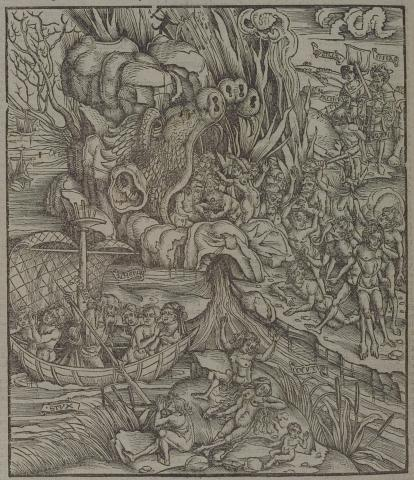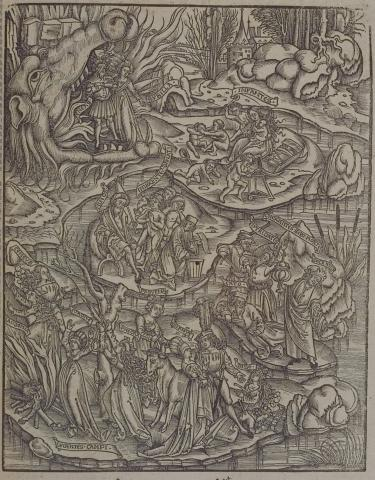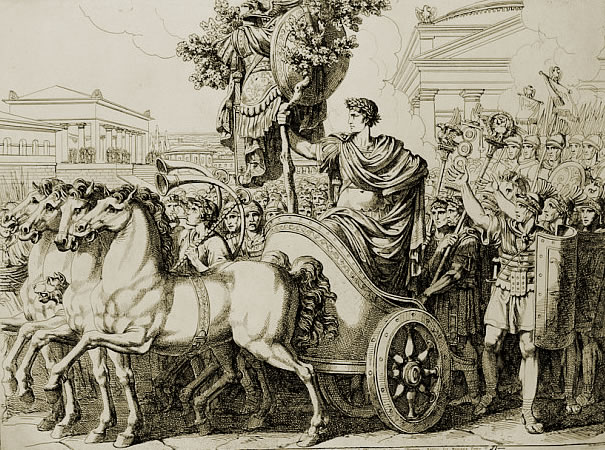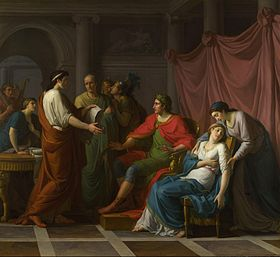8.2 Section One: Book VI: Descent to the Underworld ☠️
19 min read•june 18, 2024
Jack Marso
Riya Patel
AP Latin 🏛
24 resourcesReview of Unit 5
Section One: Book VI: Descent to the Underworld
Lines 295-332
Hinc via Tartareī quae fert Acherontis ad undās
Turbidus hīc caenō vastāque vorāgine gurges
aestuat atque omnem Cōcytō ērūctat harēnam.
Portitor hās horrendus aquās et flūmina servat
terribilī squālōre Charōn, cui plūrima mentō
cānitiēs inculta iacet, stant lūmina flammā,
sordidus ex umerīs nōdō dēpendet amictus.
- Parse the Latin verb fert in line 1
- Identify the case of the Latin word caenō in line 2 (pay close attention)
- Identify the case AND number of the Latin words omnem and harēnam in line 3?
- What syntactic structure is terribilīs squālōre in line 5?
- Translate the word in context qui in line 5 and identify the case.
- Accusative singular: Omnem is from the masculine third declension adjective omnis, omnis in the nominative and genitive. Similarly, harenam is from the feminine first declension noun harena, harenae in the nominative and genitive. They both translate exactly like the nominative, thus making it accusative.
- Third-person singular present active indicative: Fert comes from the third conjugation irregular Latin verb fero, the present infinitive ferre, the perfect active infinitive tuli, and the supine latum. In this case, the subject is Aeneas, of which is a “he” making it a third-person singular verb. Fero is declined initially without adding any vowels as most conjugations would rather do, but there is an “e” added in the imperfect and future tenses to distinguish the present tense. It’s active mainly because there is no “tur” instead of simply a “t”. Lastly, it’s indicative because there is the vowel “a” added in the subjunctive in third declension verbs, and there is not one shown in fert. Therefore, fert is translated as leads in this particular translation.
- Ablative of Description or Ablative of Quality: Ablative of Description is the ablative that becomes modified by a genitive or an adjective that denotes a quality for or of something else. In this particular translation, it means dreadful in his squalor. Here dreadful is the adjective that denotes the quality of Charon’s squalor.
- Ablative: Caeno comes from the second-declension neuter word caenum, caeni in the nominative and genitive. In this particular translation, it means with mud meaning it can only be ablative now. Ablatives are translated as by, with, from, in, at, or on _______
- To whom or to which; dative singular: Cui is a phrase that is just as important as qui, quae, or quod, but often not taught to the same extent. Cui comes from qui itself and is translated as to whom or to which Charon in means of describing his dreadful appearance. Therefore, the dative is the only case that it can be because datives are translated as to or for _______.
Aenēās mirātus enim mōtusque tumultū. “Dīc,” ait, “ō virgō, quid vult concursus ad amnem? Quidve petunt animae? Vel quō discrīmine rīpās hae linquunt, illae rēmīs vada līvida verrunt?
Then Aeneas, stirred and astonished at the confusion, said: ‘O virgin, tell me, what does this crowding to the river mean? What do the souls want? And by what criterion do these leave the bank, and those sweep off with the oars on the leaden stream?
Breakdown of Lines 295-332 🔎
- At the beginning of the required lines for unit 8, Vergil vividly describes the filthiness of the Underworld. From the road to Acheron “thick with mud” and Coctyus filled with sand, he then shifts his attention to Charon himself, visualizing him in great detail.
- Although we don’t nearly cross the river until the next section, Sibyl’s experience informs Aeneas of his details. Charon is “dreadful in his squalor” and “unkempt” in all aspects of his personal build, only reiterating how disgusting it truly is. He is old, not “fresh and green” anymore, which references the Old Testament and symbolizes his own Christian beliefs.
- Vergil continues by shifting his attention to the depth of bodies within the river: “men and women,” “noble heroes,” and “boys and unmarried girls” in vast numbers by comparing it to leaves falling at “the first frost of Autumn” and the number of birds that flock during the “cold of the year." It’s clear that the river is full of bodies, dead in countless ways, and lives lived in many diverse ways. The scene of the “cold” continues to bring the err of death as well.

Aeneas and the Sibyl, in the top right corner, near the shores of the Cocytus river as the undead enter through the mouth of the Underworld while Charon ferries Shades across the river. Image courtesy of University of Hieldelberg
- The spotlight is then refocused back to Charon, who would be “denying others away,” including Aeneas, but accepting “now these,” which refers to the dead. Aeneas is astonished by this supposed denial and asks Sibyl what the big deal is about the masses of souls across the shoreline. Sibyl explains that these souls were “destitute and unburied” and “those that the waves carry were buried.”
- Therefore, Charon cannot carry them across the Styx until “their bones are at rest in the Earth” or their unburied souls must wait years before crossing. In retrospect, Vergil exposes Aeneas’s soft spot once more as he thinks deeply about the sad situation of the unburied souls and in turn pities their “sad fate in his heart.”
Lines 384-425
Umbrārum hic locus est, somnī noctisque sopōrae: corpora vīva nefās est Stygiā vectāre carīnā. Nec vērō Alcīdēn mē sum laetātus euntem accēpisse lacū, nec Thēsea Pirithoümque, dīs quamquam genitī atque invictī vīribus essent.
Tartareum ille manū custōdem in vincla petīvit ipsius ā soliō rēgis trāxitque trementem; hī dominam Dītis thalamō dēdūcere adortī.
- Name one AND only one description of the Underworld as told by Charon in line 1.
- Translate in context line 2.
- Name one AND only one individual that Charon took across the lake in lines 3-4
- Translate in context the words dīs quamquam genitī atque invictī vīribus essent.
- What were the objectives of either Hercules OR Theseus and Pirithous?
- Place of Shadows or [Place] of Sleep or [Place] of Drowsy Night
- I’m not allowed to carry living bodies in this Stygian boat: Readers can understand that the location is now the River of Styx. Charon emphasizes what Sibyl previously informed us that that living bodies can’t cross the river Styx. It’s important to recognize the corpora viva was the nominative translated as living bodies. Vectare was the present infinitive translated as to carry. Stygia and carina were supposed to go together since they’re ablative to form in this Stygian boat. Lastly, nefas means forbidden or crime, so to make it sound more precise, it comes out to be I’m not allowed when added with an est.
- Hercules or Theseus or Pirithous
- ...though they had been children of gods, and unrivaled in strength: To start, dis in the genitive and can be translated as of gods. Quamquam and atque are conjugations that make the sentence comprehensible, meaning though and and respectively. Geniti is the first nominative in this sentence that refers to Hercules, Theseus, and Pirithous. It then normally translates to produced or engendered, but to make sense with the term gods, it was altered to mean children. Invicti essent is a third-person plural pluperfect passive subjunctive translating as they had been (children of gods) unrivaled. Lastly, viribus is the accusative that normally ends Latin sentences, meaning in strength.
- Hercules: Came for Cereberus. Theseus and Pirithous: Came for the Queen (Persephone)
Tumida ex īrā tum corda resīdunt; nec plūra dixerat hīs. Ille admīrāns venerābile dōnum fātālis virgae longō post tempore vīsum caeruleam advertit puppim rīpaeque propinquat. Inde aliās animās, quae per iuga longa sedēbant, dēturbat laxatque forōs; simul accipit alveō ingentem Aenēān.
Then the anger in his own swollen breast vanished. Nothing more was spoken. Venerating at the valued offering of fateful twigs, seen once more after some length, he flipped the stern of the dark skiff towards them and neared the shore. Then he routs the other souls who sat on the extended benches, cleared the footbridges: and took upon mighty Aeneas on board.
Breakdown of Lines 384-425 🔎
- Aeneas and Sibyl continue on their path within the “silent forest” in order to cross the river Styx. However, Charon discovers their presence as a hostile and armed one, “attack[ing] them verbally” and unprompted[ly].
- Vergil shifts his attention to an alternate view of the Underworld as “a place of shadows, of Sleep and drowsy Night.” As Sibyl already stated, Charon reiterates that the Underworld can’t carry unburied souls, although there is a sign of persuading him as Hercules, Theseus, and Pirithous had crossed previously solely for different reasons.

On the left side of the picture, Aeneas stands next to Charon preparing for crossing across the marshy river. Cerberus growls from an unexpected intruder, but Aeneas shows Charon the golden bough allowing himself to enter the Underworld. Image Courtesy of University of Hieldelberg
- Aeneas attempted to settle Charon down, stating “There’s no such trickery here” this time around. Aeneas is merely trying to visit the spirit of the father, not become a nuisance. Aeneas ends his pleading with pulling at Charon’s heartstrings in endeavoring to cross based mainly on an emotional cause.
- The “anger in his swollen breast subsided” and Charon was touched by his sentimental words. Although Charon isn’t allowed to do this, he motions the skiff toward them and closes into the bank. The sweet talk of Aeneas paid off—"other souls who sat on long benches” were routed off and Aeneas was allowed to get on.
Lines 440-476
Before we dive into breaking down the Latin lines into the text we can more clearly comprehend, we will answer some questions based on the designated skill categories! The skill categories for these lines are Reading and Comprehension, Translation, and Contextualization so be aware of that when you answer these questions!
His Phaedram Procrimque locis, maestamque Eriphylen
crudelis nati monstrantem volnera, cernit,
Evadnenque et Pasiphaen; his Laodamia
it comes, et iuvenis quondam, nunc femina, Caeneus,
rursus et in veterem fato revoluta figuram.
inter quas Phoenissa recens a vulnere Dido
errabat [silva in magna]; quam Troius heros
ut primum iuxta stetit agnovitque per umbras
- In Roman culture, who of the three women Aeneas saw, was married to Theseus?
- In Roman culture, of the four individuals walking together, which of them was once a young man?
- Write out ALL of line 5 (rurus . . . figuram) and mark scansion
- Name one AND only one description of Dido in line 6 and 7
- Write out ALL of line 8 (ut . . . umbras) and mark scansion
- Phaedra: Phaedra was the daughter of Minos and she was the Queen of Crete. She was married to Theseus, who kidnapped Phaedra for abandoning her sister, Ariadne, who saved Theseus when killing the Minotaur. Procris was the third daughter of the Athenian king, Erechtheus, and was detailed famously by Ovid. Lastly, Eriphyle was the wife to the king of Argos, Amphiaraus, and was a Greek figure responsible for persuading her husband to initiate the Seven Against Thebes raid, when the Necklace of Harmonia, a necklace that brought great misfortune to its owners, was given to her in exchange.
- Caenus
- From left to right: spondee-spondee-dactyl-spondee-dactyl-spondee
- Dido wandered or Dido’s wound was still fresh: In Book 4 of the Aeneid, it’s the beginning of a roller coaster love affair for Aeneas and Dido thanks solely to Juno and Venus but grows bitter once Dido finds out that Aeneas is leaving for Carthage. This was in part due to King Iarbus of Numidia praying to Jupiter Hammon, his father, who then talks to Mercury to send him on his way. Dido can no longer bear to live and builds a pyre to burn all of what she knew of Aeneas, but once she recognizes his fleet leaving, she curses the Trojans and the Carthages for eternal hate and inevitably creates the beginning of the Punic Wars in turn. Dido then commits suicide on that pyre, falling on a sword that Aeneas had previously given her.
- From left to right: spondee-spondee-dactyl-spondee-dactyl-spondee
sed me iussa deum, quae nunc has ire per umbras,
per loca senta situ cogunt noctemque profundam,
imperiis egere suis; nec credere quivi
hunc tantum tibi me discessu ferre dolorem.
siste gradum teque aspectu ne subtrahe nostro.
quem fugis? extremum fato quod te adloquor hoc est.
But I was ordered by gods, who urged me by their command, that now force me to go through the shadows, through places rough with carelessness, and deepest night: nor did I confide in my departure there would ever bring so much grief to you. Stop your footsteps and do not withdraw yourself from our vision. What do you flee? This is the last speech with you that fate allows.
Breakdown of Lines 440-476 🔎
- At this point in the book, Aeneas and Sibyl approach the Field of Mourning and begin noticing individuals on all sides and begin naming them. The lives of “harsh love devours” and their pain and sorrow are still within them even in death.
- In this collection, “Aeneas saw Phaedra, and Procris, and sad Eriphyle.” Phaedra’s love was rejected by Hippolytus, Procris, of which thought her husband was having an affair, is killed by him when he suspected she was a wild animal when he was hunting and Eriphyle was still “displaying the wounds of her cruel sound” when her son committed matricide.
- Aeneas continues noticing more faces: “Evadne, and Pasiphae: with them walked Laodamia, and Caeneus.” Evadne’s husband was killed by a lightning bolt, and in turn, she committed suicide, Pasiphae experienced lust and mated with the minotaur. Laodamia’s husband was killed during the Trojan War and she committed suicide in return. Lastly, Caeneus was raped as a young girl, where she was metamorphosed into a boy to never experience that again.

Aeneas and the Sibyl stand in the mouth of a monster and look upon features of the Underworld, including the Mourning Fields while he spots women who died for love. Image courtesy of University of Heidelberg.
- Then, all of a sudden, Aeneas spots Dido, his former lover, wandering. He stands right next to her, and therefore can easily recognize her since she is a “new moon rising through a cloud.” Aeneas begins to weep while attempting to talk to her. Aeneas still can’t believe that the rumor, although not much time has passed, was true and that she actually killed herself with the sword Aeneas gave her.
- Aeneas initially wonders if he was the cause of her death, but remembers that he “left the shores unwillingly” and was “ordered by the gods”. Aeneas did want to stay, although it was never his choice. He didn’t think that it would take that much of a toll on her.
- However, Dido doesn’t believe him and begins to flee, knowing this is the last time she will ever see him. Dido didn’t care though, “she turned away, her eyes fixed on the ground” and her expression is still like “a cliff of Parsian marble.”
- Dido completely ended the attempted advancement without a word by retreating to her former Phoenician husband, Sychaeus. Dido was the only lover that had their own lover there from the seven women we discussed earlier. In the end, there was nothing else Aeneas could do but travel, pitying Dido, sadly with tears.
Lines 847-899
.
Sic pater Anchises, atque haec mirantibus addit:
“aspice, ut insignis spoliis Marcellus opimis
ingreditur victorque viros supereminet omnes.
hic rem Romanam magno turbante tumultu
sistet eques, sternet Poenos Gallumque rebellem,
tertiaque arma patri suspendet capta Quirino.”
- Based on your knowledge of Roman history and the text, where has Claudius Marcellus shown up before?
- Why do you think Marcellus’s military strength is emphasized in these lines?
- Why do you think Anchises described Marcellus as “turbulent with fierce confusion”?
- What is referred to as the “Supreme Prize” as line 2?
- Why are the Gauls referred to as “rebellious” when Carthage is predominantly known for their action in the Punic Wars?
- Hero of the Second Punic War: Claudius Marcellus was elected five times to the Roman consul and an important Roman general during the Second Punic War. The spolia opima was given with respect to his hand-to-hand combat skills when killing a Gallic military leader named King Viridomarus in 222 BC at the Battle of Clastidium.
- To emphasize the strength of Romans in both war and politics: This was previously explained in lines 847-853 (if you didn’t catch that when sight-reading, I suggest going back to find it). The Greeks, on the other hand, would-be masters of art and science. Claudius Marcellus has shown his own integrity and honor to the Roman army when he died in battle, giving everything he had to the Roman citizens. The spolia opima sparked a rush for military conquests and achievement within warfare. In turn, because of its prominence previously, there’s no reason with the same type of ethic that it shouldn’t continue if Anchises’s foretelling is correct. Notice that this military emphasis continues within this section of lines as you read further.
- Marcellus the Elder was driven primarily on winning the war. The whole basis of the Punic Wars was primarily on expansionary advancements and control; what side would have the strongest military and therefore control the resources and trade of Mediterranean. The soldiers fought for Rome in honor, not because they were reaping benefits of the war, that was for the wealthy and aristocracy. It was clearly either Carthage or Rome earning the sphere of influence within that region, and eventually, Rome won and left Carthage powerless in the aftermath. This continues for the Roman Army: They would continue to fight to either expand or protect their empire.
- The spolia opima: This was the most prestigious award a Roman general could earn.
- In the Second Punic War, famous Carthaginian general Hannibal Barca utilized Gallic mercenaries in a series of invasions, playing a role in some victories as well. Therefore, they could be referred to as “rebellious,” since Carthage and Rome were the two “heavyweights,” and Gaul joined in on the side of Carthage in an attempt to sack Rome.
nec puer Iliaca quisquam de gente Latinos
in tantum spe tollet avos, nec Romula quondam
ullo se tantum tellus iactabit alumno.
heu pietas, heu prisca fides invictaque bello
dextera! Non illi se quisquam impune tulisset
obvius armato, seu cum pedes iret in hostem
seu spumantis equi foderet calcaribus armos.
No boy of the line of Ilius shall so exalt his Latin ancestors by his show of promise, nor will Romulus’s land ever take more pride in one of its sons. Alas for virtue, alas for the honour of ancient times, and a hand invincible in war! No one might have attacked him safely when armed, whether he met the enemy on foot, or dug his spurs into the flank of his foaming charger.
Breakdown of Lines 847-899 🔎
- Anchises moves on from the historical and cultural and his own foretelling of history to his own beliefs of the Romans (if you haven’t sight-read those sections, you can really gain some prominent contextualization skills there). Anchises believes that although the Romans won’t specialize in the arts and sciences; “hammer out bronze that breathes more delicacy than us” or “scans with instruments the movement of the skies,” the Romans will become innovated in their military “command the nations with your power” and politics “crown peace with law”
- Anchises shifts his focus to a spotted Claudius Marcellus. He was a prominent war general during the Second Punic War that was honored with the “Supreme Prize," the spolia opima. Aeneas then spotted an individual walking beside him, but not “joyful” and “his eyes downcast”. Anchises informed him that it was his own son, and his undeniable “presence he had,” but sadly “sad shadows hovered around his own head”.

Marcus Claudius Marcellus being celebrated for his military success and being granted the spolia opima, the highest honor a military general in Rome could receive. Image Courtesy of Rome and Art.
- Marcellus the Younger was Augustus Caesar’s nephew and became a well-known politician because of it, but sadly died before he could have had his chance to the throne of an illness that spread throughout Rome. The “Fates will only show him the world” explains how brief his life truly was and “not allow[ed] to stay longer.” Along with the other figures that Rome will have, Rome would have been too powerful to the gods if he was allowed to live. Vergil makes it seem like it’s a required act by the gods.
- The next few lines explain Marcellus’s funeral where Augustus’s tomb is held in “The Field of Mars. Marcellus was the first occupant of this “new-made tomb.” Marcellus will be so honored by ancestors and future Romans by his show of promise that “Romulus’s land” will never “ever take more pride in one of its sons.”

Octavia fainted about the lines about her son during a private recitation with Vergil. Image courtesy of the National Gallery.
- Anchises again refers to his talented skill in warfare, and how unfair for enemies his tactics were. It could have been only better if he had survived longer. Anchises fears that if Aeneas can’t escape his own fate of dying young, he will be a Marcellus himself, although nothing can change it.
- Anchises finishes his review of the future Romans and Aeneas is informed about “the wars he must soon fight,” the Laurentine peoples and the city of Latium, and how to tackle each situation.
- There are two gates to leave the Underworld; that of the horn which is an easy passage, while the ivory gate sends “false dreams to the world above” by the Gods of the Dead. Sibyl and Aeneas meet up with Anchises, take the Ivory gate, and rejoin his people at the shore.

Fiveable
Resources
© 2025 Fiveable Inc. All rights reserved.